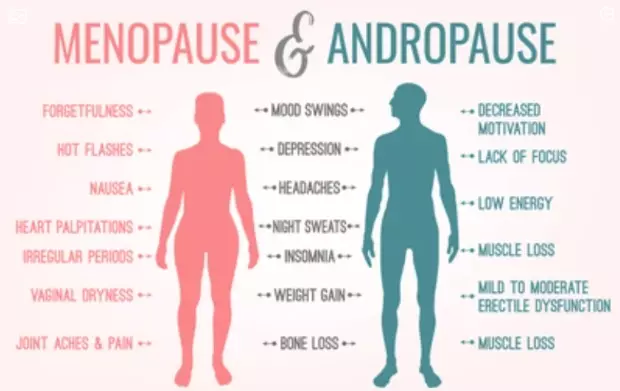
During menopause, the amount of follicles in the ovaries decreases and accordingly, estrogen production decreases. Over time, estrogen production ceases and the ovaries shrink. As a result, the menstrual cycle is interrupted and reproductive ability is lost.
Andropause, also known as "male menopause", can be defined as the combination of depression, loss of sex drive, erectile dysfunction and other physical and emotional symptoms that some men experience when they reach their late 40s to early 50s.
Menopause and andropause are normal parts of aging. Menopause and andropause can be treated with hormone therapy, lifestyle changes, and/or supplements.
-
Classıfıcatıon Of Menopause It’s Symptoms And Treatment
Menopause is divided into three periods according to the classification of the World Health Organization:
- Premenopause: It covers the period from the first symptoms to menopause. Follicle activity in the ovaries slows down. Periods become irregular. This process can take several months or years.
- Menopause: It is the last menstrual bleeding.
- Postmenopause: It covers the period of 6-8 years from menopause to old age. For a woman to be postmenopausal, she must not have had a period for 12 months.
-
What Are the Symptoms of Menopause?
A person can understand that she will enter menopause based on the symptoms that occur in his body. The heaviness or prolongation of menstrual periods and the irregularity of these periods are the harbingers of menopause.
During menopause, many physical and psychological changes occur in the person such as:
- Hot flash, night sweats
- Palpitations, dizziness, headache
- Lassitude, breast tenderness, muscle and joint pain
- Sleep disorders, increased appetite, increase of body hair(hirsutism)
- Weight gain, urinary incontinence when coughing, vaginal dryness and pain during intercourse
- The slowing of the metabolic rate during menopause can lead to weight gain. In addition, the risk of heart diseases such as arteriosclerosis and hypertension increases in menopause.
- Itching in the vulva, frequent urination, urinary incontinence, sagging bladder, uterine prolapse and constipation can be seen.
During menopause, you may feel uncomfortable and stressed, or you may notice that your sleep is disturbed. Keep in mind that this is due to a transitional period and your situation will improve.
It is necessary to dress in layers against hot flashes, which are common during menopause. Thus, the clothing can be reduced in case of hot flashes. It is beneficial to reduce spices and caffeine and to avoid smoking and alcohol. Relaxing oils are used against painful sexual intercourse due to estrogen deficiency.
Menopause is not treated as it is a natural process. However, there are many different treatment options to improve a person's quality of life. Hormone replacement therapy (GRT) is one of them.
-
Classıfıcatıon Of Andropause It’s Symptoms And Treatment
Although the name resembles the "menopause" period experienced by women, there are some important differences between andropause and menopause. While all women enter menopause after reaching a certain age, andropause is not something that all men experience.
With menopause, the reproductive function of the female reproductive organs stops but this may not be the case in andropause. On the other hand, while menopause occurs entirely due to changes in the woman's hormone profile, andropause may not occur due to hormonal changes.
In the decrease of male hormones experienced during andropause period, hair growth in the body decreases, body fat increases, muscle and bone mass decreases, and complaints such as anemia may occur.
-
What Are the Symptoms of Andropause
- The clearest symptom seen in men entering andropause is the decrease in the effects of male hormones. This situation primarily reduces sexual power.
- The following symptoms related to sexual function are seen: loss of libido, decrease in sexual arousal and erection quality, erectile dysfunction, decrease in sexual intercourse frequency, infrequent night erections, delayed orgasm, decrease in sperm production and semen volume.
- Andropause symptoms can also occur due to mental health conditions such as depression and various systemic diseases such as diabetes and hypertension.
- Chronic fatigue with anemia, decrease in general physical performance
- Dry skin, reduction in hair and beard growth, sweating, hot flashes
Andropause that caused by hormonal reasons, is defined as the age-related decline in testosterone production at the age of 50 and over. Stress directly affects male hormone production. For this reason, men who cannot manage their stress, carry it to their work and family life, who are restless, anxious and unhappy, may produce less male hormone and cause andropause to start earlier.
If andropause is caused by an aging condition, it does not go away on its own and its signs and symptoms may become more severe over time. If the drop in testosterone levels is due to different medical reasons, eliminating the underlying problems may lead to the disappearance of the condition.
